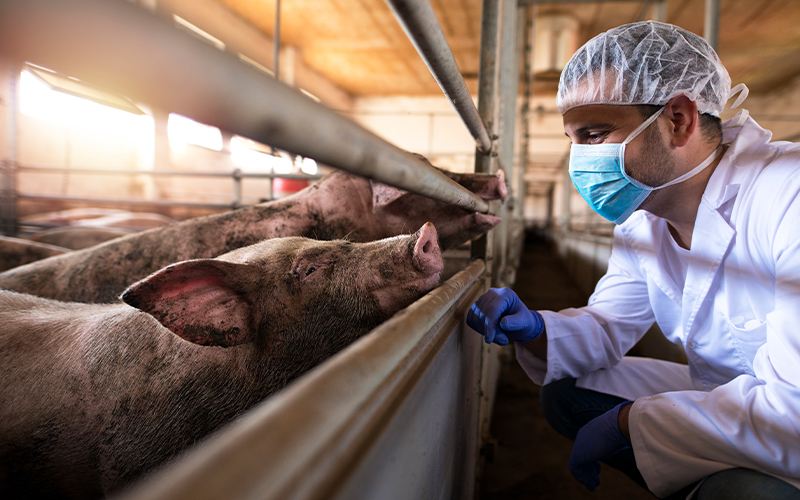Erysipelas in Pigs

What is Erysipelas?
Erysipelas is an infectious disease that can occur in most animals, including humans. Erysipelas in pigs is caused by a bacteria (Erysioelothrix rhusiopathiae) and is commonly referred to as the “diamond pig disease”. The bacteria is carried by up to 50% of pigs in their tonsils. Erysipelas generally affects growing pigs over 12 weeks of age and is easily spread from one pig to another through feces and nasal secretions. The disease can manifest as skin lesions, arthritis, or inflammation of valves in the heart (valvular endocarditis). Erysipelas is a zoonotic disease meaning it can be transmitted from pigs to people though good hygiene (washing hands, covering wounds) is normally preventative of spread to people. Erysipelas is resistant to many environmental influences (cold, heat, rain) and can survive for extended periods of time. The organism is resistant to many antibiotics but can be destroyed by many common disinfectants. Erysipelas is more common in production pig operations, but pet pigs have been diagnosed.
What are the signs that your pig has Erysipelas?
Disease outbreaks may be acute or chronic. In the chronic form lameness is the most noted sign. Characteristic signs of acute outbreak are
- Inappetence
- Lethargy
- Very high temperature (104-108 F)
- Skin lesions (Diamond shaped skin swellings)
- Painful joints
- Respiratory distress (trouble breathing)
Mild symptoms can quickly progress to severe life-threating signs. Collapse and death sudden death have been noted to occur.
How can we diagnose Erysipelas?
If your pig shows signs any of these signs, you should contact your primary care veterinarian immediately to have them evaluated. The evaluation will allow your veterinarian to detect abnormalities. They may look for the following abnormalities: fever, skin lesions, a heart murmur and joint swelling. They may perform two blood test 14 days apart called an hemagglutination inhibition test to test for rising titer levels. As diagnosis can be difficult, if your veterinarian notices any of these signs, you may be referred to a Board-certified Large Animal Internal Medicine specialist for further laboratory testing which may include further blood tests, radiographs of joints, taking a fluid sample from the joints or imaging of the heart through echocardiology.
What are the treatment options?
Routine vaccination is effective at preventing acute disease. You should speak to your veterinarian about the best vaccine protocol for your pet. Vaccine protocols are often adjusted according to your pet’s risk of disease. Pigs that do become infected are generally responsive to a course of veterinarian guided antibiotics (normally penicillin). Pigs that develop valvular endocarditis or arthritis may require long term treatment
What is the outcome after treatment?
Generally, pigs infected with Erysipelas have a good outcome with proper treatment. In pigs that develop valvular endocarditis or arthritis the long-term prognosis is guarded as animals with arthritis often have increasing lameness and animals with valvular endocarditis can develop heart failure. Pigs that are diagnosed with Erysipelas may still be able to spread the organism even after disease resolution (chronic carriers) so development of a farm protocol with your veterinarian after infection is essential.
Articles by Specialty
- Cardiology (19)
- Large Animal Internal Medicine (23)
- Neurology (17)
- Oncology (21)
- Small Animal Internal Medicine (29)
Articles by Animal
- Cats (35)
- Dogs (52)
- Farm Animals (5)
- Horses (12)
